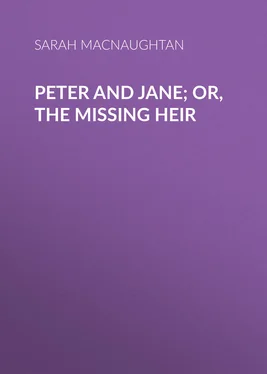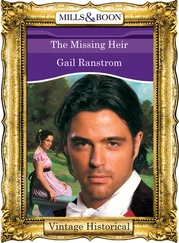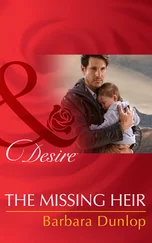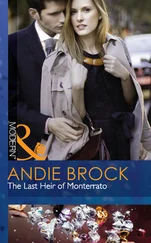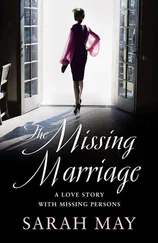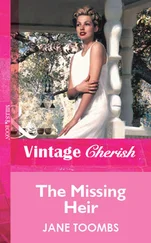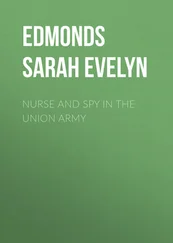Sarah Macnaughtan - Peter and Jane; Or, The Missing Heir
Здесь есть возможность читать онлайн «Sarah Macnaughtan - Peter and Jane; Or, The Missing Heir» — ознакомительный отрывок электронной книги совершенно бесплатно, а после прочтения отрывка купить полную версию. В некоторых случаях можно слушать аудио, скачать через торрент в формате fb2 и присутствует краткое содержание. Жанр: foreign_prose, foreign_antique, на английском языке. Описание произведения, (предисловие) а так же отзывы посетителей доступны на портале библиотеки ЛибКат.
- Название:Peter and Jane; Or, The Missing Heir
- Автор:
- Жанр:
- Год:неизвестен
- ISBN:нет данных
- Рейтинг книги:3 / 5. Голосов: 1
-
Избранное:Добавить в избранное
- Отзывы:
-
Ваша оценка:
- 60
- 1
- 2
- 3
- 4
- 5
Peter and Jane; Or, The Missing Heir: краткое содержание, описание и аннотация
Предлагаем к чтению аннотацию, описание, краткое содержание или предисловие (зависит от того, что написал сам автор книги «Peter and Jane; Or, The Missing Heir»). Если вы не нашли необходимую информацию о книге — напишите в комментариях, мы постараемся отыскать её.
Peter and Jane; Or, The Missing Heir — читать онлайн ознакомительный отрывок
Ниже представлен текст книги, разбитый по страницам. Система сохранения места последней прочитанной страницы, позволяет с удобством читать онлайн бесплатно книгу «Peter and Jane; Or, The Missing Heir», без необходимости каждый раз заново искать на чём Вы остановились. Поставьте закладку, и сможете в любой момент перейти на страницу, на которой закончили чтение.
Интервал:
Закладка:
'We used to take a roll of music with us when we were asked out to dinner,' she reflected, 'and it was all-important to us who should turn over our leaves for us, and we generally blushed and hesitated before we sat down to the piano at all. Last night Jane almost fought with Peter for the larger portion of the keyboard of the piano; and they played music without any tune in it, to my way of thinking, and there is no seriousness at all about any of them.'
'I wonder if they'—Miss Abingdon again referred to that distressing body of young women of the present day—'I wonder if they have ever kissed a lover's letter, or have slept with his picture underneath their pillows at night? Or have they ever lain sleepless for an hour because of a loved one's absence, or because of a cold word from him? Do they write verses, or exchange valentines, or even give each other flowers?'
Miss Abingdon recalled in her own mind the days when she and her sister used to walk together in the park, with mamma leaning upon papa's arm and pacing sedately behind; and how, when they used to sit down on one of the lawns, it had always been in a group of four. Ah! those were the days when one went home and wept because the dear one—the handsome hero who filled half a girl's thoughts and was the object of more than half her worship—had not seen, one across the crowd; or he had seen, perhaps, but girlish modest eyes were forbidden to give the signal of approach. It was more maidenly then to be oblivious of a young man's presence. 'Now,' said, Miss Abingdon, 'when they see a young man whom they know—a pal I believe they call him—girls will wave their parasols or even shout. I have known them rise from their own chairs and go and speak to a man. The whole thing is extraordinary to me.'
It was a relief to Miss Abingdon's sombre reflections when her friend, the vicar's wife, came in for a morning call. She thought that Mrs. Wrottesley's brown merino dress and bonnet, and constraining mantle which rendered all movements of the arms impossible, looked very decorous and womanly compared with the soles of a pair of brown leather shoes, and the foreshortened figure of five feet eight of slender young womanhood stretched in strenuous devotion to her strange occupation on the lawn.
When Mrs. Wrottesley seated herself opposite the window Miss Abingdon resisted an impulse to pull down the blind.
'Yesterday,' said Miss Abingdon, glancing at her niece, 'she was trying to copy a feat which she had seen at the hippodrome, and was riding one pony and driving another tandem in front of her over some hurdles in the field.'
Mrs. Wrottesley smiled with the rather provoking indulgence with which our friends regard the follies of our relations.
'She is so young,' said Mrs. Wrottesley, 'and she is very beautiful.'
'No,' said Miss Abingdon, with inward pride at her own unwavering impartiality, 'I honestly believe that if we were to consider Jane without prejudice we should find that she is simply healthy.'
'It is a great charm,' said Mrs. Wrottesley.
'No, no,' corrected Miss Abingdon quickly, 'the charm of womanhood consists in its mysteriousness. Now, the girl of to-day is simply a good fellow. She doesn't require to be understood, and she doesn't drive men crazy; she shoves her own bicycle up hills and fights for the larger half of the keyboard of the piano.' She sighed again.
'She is a moral influence,' said Mrs. Wrottesley. Mrs. Wrottesley also alluded to the girl of the period; and Miss Abingdon thought that to refer to her as 'she' or a type, instead of 'they,' had a flavour of culture about it, but she did not mean to give in.
'Yes, yes,' she said impatiently, her love of contradicting Mrs. Wrottesley and at the same time holding her own in the discussion inclining her to undue severity, 'she is as straight as any other good fellow, and she pays up if she has lost at bridge, and would as soon think of picking a pocket as of cheating at croquet; but she is not mysterious—she is absolutely comprehensible.'
'Probably,' said Mrs. Wrottesley, 'Jane's shortcomings in this respect are due to the fact that she is lamentably unaffected. Affectation, in the case of girls who ride straight and don't know what it is to have a headache, very often takes the form of boyishness. Let us console ourselves with the fact that, being perfectly natural, Jane has escaped masculinity.'
'Jane is a lady,' said Miss Abingdon severely, and with the faint suggestion of administering a snub. 'But,' she added, with that touch of superiority in her manner which obtruded itself in most of her conversation with the vicar's wife, 'there are certain accepted traditions of womanhood such as conventionality approves, and it was not called artificial to conform to them when I was a girl.'
'I remember,' said Mrs. Wrottesley, 'that we honestly thought that we were interesting when we ate very little, and I myself often used to aspire to an attractive display of timidity when inwardly I had no sensation of fear.'
As the wife of the vicar of the parish Mrs. Wrottesley wore brown merino and a mantle, but these hid a great soul securely held in check and narrowed down by a strict adherence to the small conventions and paralysing rules which society seems to have prescribed for vicars and their wives in the rural parishes of England. She prayed every morning of her life for more faith, and meant by that a narrower creed. Mrs. Wrottesley was an inarticulate woman, and had gained for herself the character of being reserved.
Her own view of things differed in all essentials from the opinions which were held by those about her, and were even inwardly opposed to theories which her husband, with such gentlemanly eloquence, expounded every Sunday morning. People thought themselves charitable when they merely said that they did not understand Mrs. Wrottesley.
'The modern girl has a good effect upon society,' she continued; 'and she is not a cat.'
'Ah, yes,' allowed Miss Abingdon, conceding a point, but prepared with unanswerable argument; 'but will she ever be loved as the old eternal feminine was loved?'
'Many people believe,' said Mrs. Wrottesley, 'that you can't be a man's divinity and surround yourself with a golden halo, and be his pal at the same time.'
'I remember,' said Miss Abingdon reminiscently, and feeling that she was still scoring heavily against her friend—'I remember we used to come down to breakfast in light gloves to match our gowns, and we drew them on when the meal was over and only removed them in the morning-room when we had taken out our embroidery to work at it.'
'And when embroidery bored us,' said Mrs. Wrottesley, 'we thought we were in love.'
'A Miss Sherard stayed here last summer,' said Miss Abingdon, 'a friend of Jane's, and she smoked cigarettes in her bedroom. I know that, for I saw the ashes in her pin-tray.'
Miss Abingdon rather enjoyed making little excursions through her guest's bedrooms of an afternoon, when she had the house to herself; and, without deigning to touch or disturb anything, she knew pretty well, for instance, whose complexion was real and whose was false, who wore powder and who did not.
Mrs. Wrottesley glanced at her own figure in the drawing-room mirror; her mantle disguised the fact that she had either a waist or a pair of arms, and she gave a little dry smile as she reflected that she had accepted a dolman cloak with all the other outward conventions of orthodoxy as understood by society in rural England.
'My cousin, Peter Ogilvie, comes here every day,' said Miss Abingdon; 'he is crossing the lawn now. In former days these two young people would have been talked about. (Peter is my cousin, you know, on my father's side of the house—he is not related to Jane.) But neither will probably mind in the least what is said about them, and for my own part I am positively unable to say whether they care for each other or not. Had I been Jane I would have sat in the arbour this morning, with a pretty, cool white dress on, reading poetry or some light romance, or working at my embroidery till my lover came, instead of being found covered with paint and with the footman's baize apron on.'
Читать дальшеИнтервал:
Закладка:
Похожие книги на «Peter and Jane; Or, The Missing Heir»
Представляем Вашему вниманию похожие книги на «Peter and Jane; Or, The Missing Heir» списком для выбора. Мы отобрали схожую по названию и смыслу литературу в надежде предоставить читателям больше вариантов отыскать новые, интересные, ещё непрочитанные произведения.
Обсуждение, отзывы о книге «Peter and Jane; Or, The Missing Heir» и просто собственные мнения читателей. Оставьте ваши комментарии, напишите, что Вы думаете о произведении, его смысле или главных героях. Укажите что конкретно понравилось, а что нет, и почему Вы так считаете.
